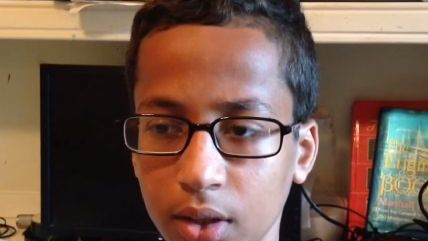Ahmed Muhamed's Arrest: Clock Kid Truthers Miss the Point
Police response was unjustified no matter what.


Various voices on the right (and some on the left) are attempting to poke holes in the prevailing narrative that 14-year-old Muslim student Ahmed Muhamed was wrongly detained for bringing a homemade clock to school. Their criticisms—which smack of conspiracy—gained at least a semi-respectable adherent in left-leaning atheist intellectual Richard Dawkins, who humored the idea that Ahmed hadn't really invented a clock in series of Tweets:
If the reassembled components did something more than the original clock, that's creative. If not, it looks like hoax http://t.co/bBcaWoJpbd
— Richard Dawkins (@RichardDawkins) September 20, 2015
It's fine to disassemble & reassemble a clock. http://t.co/bBcaWoJpbd But don't claim it's your INVENTION. https://t.co/fZFF59vV0n
— Richard Dawkins (@RichardDawkins) September 20, 2015
Whether Ahmed "invented" a clock or merely reassembled the various components of what was already a clock is really beside the point. Frankly, it just doesn't matter. Of course a 14-year-old is going to use the word "invention" a little more loosely than the U.S. Patent Office. The relevant question is whether the school and police responses to the clock were appropriate—and they weren't, regardless of the boy's intentions with the clock. (Dawkins later clarified in subsequent tweets that he though Ahmed's arrest was "undoubtedly wrongful.")
Others opined that Ahmed had some sinister ulterior motive and may have even orchestrated this incident on purpose. Less extreme versions of this story claim that at the very least, the family has capitalized on Ahmed's treatment: Ahmed's father is vocal about the injustices American Muslims have faced since 9/11, these people claim, and Ahmed's sister coached him on what to say and promoted his story on social media as an example of Islamophobia.
It's true, of course, that the consequences of this ordeal are largely favorable for Ahmed. President Obama invited him to the White House, Mark Zuckerberg invited him to Facebook headquarters, various engineering programs and internships are eager to help him, etc. etc. Ahmed will make out well after all this is done, it seems.
Still, none of these details—whether they are true, false, or something in-between—have anything to do with the rightness of arresting Ahmed in the first place.
None other than atheist lefty Bill Maher has been most bold in offering a very lukewarm endorsement of the school's actions. Unlike the other takes on Ahmed—which attempt to discredit him and his family without offering any information relevant to the actual incident—Maher's is at least worth addressing. He said on his most recent show, "The people at the school thought it might be a bomb perhaps because it looks exactly like a fucking bomb." Maher eventually chastised the police for getting it wrong and said they should apologize, but he pushed back against the notion that it was totally crazy for the school to worry about an Islamic terrorist attack:
"We arrest him, put a kid after school for a couple of hours. This is not the end of the world….I would love it if one of the adults who has talked to him would also say, 'You know what, what happened to you was wrong, but maybe one of the reason it happened to you is because in our religion, we were responsible for 9/11, the Madrid bombings, the London bombings…"
Maher acts like routinely arresting kids out of some misguided paranoia about domestic Islamic extremism, or school safety in general, is no big deal. It's difficult to overstate just how incorrect this thinking is. Not every wrongfully detained high schooler is lucky enough to have his or her outrageous treatment immediately recognized by the media as such and parlay that into an invitation to the White House. In a great many cases, kids who break some silly rule, or cause a scene because they brought something to school that an overly cautious administrator construed as a lookalike weapon, are suspended, expelled, and even arrested, and that's it—no national blowback, just a young life ruined.
It's not so easy for kids to recover from the almost perfunctory criminal charges levelled against them for offenses that would ideally earn a mere slap on the wrist. Teens with criminal records are significantly less likely to graduate high school, for one thing, but the negative consequences follow them for the rest of their lives, impacting likelihood of college graduation, future employment, and income potential.
Consider the scope of the problem—often referred to as the "school-to-prison pipeline"—best explained by this Wall Street Journal article from last year:
Stephen Perry, now 18 years old, was trying to avoid a water balloon fight in 2013 when he was swept up by police at his Wake County, N.C., high school; he revealed he had a small pocketknife and was charged with weapons possession. Rashe France was a 12-year-old seventh-grader when he was arrested in Southaven, Miss., charged with disturbing the peace on school property after a minor hallway altercation.
In Texas, a student got a misdemeanor ticket for wearing too much perfume. In Wisconsin, a teen was charged with theft after sharing the chicken nuggets from a classmate's meal—the classmate was on lunch assistance and sharing it meant the teen had violated the law, authorities said. In Florida, a student conducted a science experiment before the authorization of her teacher; when it went awry she received a felony weapons charge. …
At school, talking back or disrupting class can be called disorderly conduct, and a fight can lead to assault and battery charges, said Judith Browne Dianis, executive director of the Advancement Project, a national civil-rights group examining discipline procedures around the country. Some of these encounters with police lead to criminal records—different laws for juveniles apply across states and municipalities, and some jurisdictions treat children as young as 16 as adults. In some states, for example, a fistfight can mean a suspension while in North Carolina a simple affray, as it is called, can mean adult court for a 16-year-old.
It's worth pointing out that these trends of overcriminalization and increasing police militarization in American schools have unfolded over a time period of decreasing violence—both within schools and nationwide. Indeed, school remains just about the safest possible place for kids. There's just no legitimate safety rationale for routinely detaining and removing students who perpetrate mild misbehavior or violate, in a technical sense, overly broad prohibitions against weapons in schools.
To the extent that Maher implied Ahmed's treatment was ever-so-slightly justified because of his Muslim faith, he's wrong. But liberals who claim Ahmed's treatment is solely the result of his Muslim faith are also wrong. As should be perfectly clear from the myriad examples I cited, Ahmed's religion may have impacted the flavor and overall likelihood of his arrest, but it's not remotely true that ethnic minorities are the only victims of zero tolerance-style school disciplinary measures.
These disciplinary measures, and the criminal charges that stem from them, are a bad solution to a problem that just doesn't exist. And that's true, regardless of the race or religion of a student who brings a ticking clock to school.
Read more on Ahmed's case from Nick Gillespie and Ed Krayewski.


Show Comments (297)